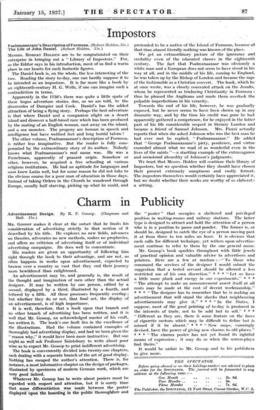Impostors
MESSES. ROBERT ...OLDEN are to be congratulated on their enterprise in bringing out a " Library of Impostors." For, as the Editor says in his introduction, most of us find a warm place in our hearts for such fantastic figures.
The Daniel book is, on the whole, the less interesting of the two. Reading the story to-day, one can hardly suppose it to be intended as an imposture. It is far more like a book by an eighteenth-century H. G. Wells, if one can imagine such a contradiction in terms.
Apparently in the 1750's there was quite a little spate of these bogus adventure stories, due, as we are told, to the discoveries of Dampier and Cook. Daniel's has the added attraction of being a flying story. Perhaps the best adventure is that where Daniel and a companion alight on a desert island and discover a half-breed race which has been produced by the mating of an English woman, cast away on the island, and a sea monster. The progeny are human in speech and intelligence but have webbed feet and long horrid talons !
The other volume, Psalmanaazaar's description of Formosa, is rather less imaginative. But the reader is fully com- pensated by the extraordinary story of its author. Nobody knows what Psalmanaazaar's real name was. He was a Frenchman, apparently of peasant origin. Somehow or other, however, he acquired a free schooling at various religious institutions. He had an aptitude for languages and soon knew Latin well, but for some reason he did not take to the obvious course for a poor man of education in those days. Instead of taking Orders in the Church he wandered through Europe, usually half starving, picking up what he could, and
pretended.to be a native of the Island of Formosa, because at that time almost literally nothing was known of the place.
We get an extraordinary picture of -the ignorance and credulity even of the educated classes in the eighteenth century. The fact that Psalmanaazaar was obviously a white man and a European does not seem to have stood in his way at all, and in the middle of his life, coming to England, - he was taken up by the Bishop of London and became the rage of the fashionable as a Christian convert. The book, which he at once wrote, was a closely concealed attack on the Jesuits. whom he represented as traducing Christianity in Formosa : thus he pleased the Anglicans and made them overlook the palpable imperfections in his veracity.
Towards the end of his life, however, he was gradually exposed, but he never seems to have been shown up in any dramatic way, and by the time his credit was gone he had apparently gathered a competence, for he enjoyed in the latter part of his life considerable respect in literary London and became a friend of Samuel Johnson. Mrs. Piozzi actually reports that when she asked Johnson who was the best man he had ever met he replied, " Psalmanaazaar." He added that " George Psalmanaazaar's piety, penitence, and virtue exceeded almost what we read of as wonderful even in the lives of the saints "—a startling example of the extravagance and occasional absurdity of Johnson's judgments.
We trust that Messrs. Holden will continue their library of Impostors, but we question whether they should have chosen their present extremely sumptuous and costly format. The impostors themselves would certainly have appreciated it, but we doubt whether their works are worthy of so elaborat: a setting.


































 Previous page
Previous page